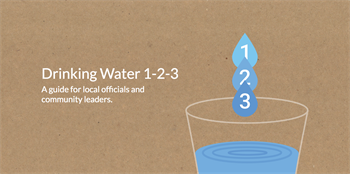
While Cook County sits on the shores of a Great Lake, our region is not without its share of drinking water issues.
The Chicago Tribune’s recent Water Drain series on drinking water problems certainly struck a chord with many, particularly around crumbling infrastructure and inequitable water rates. This series prompted the Cook County Commissioners to take a closer look—an examination which included a recent hearing for which I was asked to provide expert testimony ealier this month.
Following are excerpts from that testimony that are both timely and imperative to tackle today:
Drinking water service is a foundational element of livable communities, and protecting our citizens—both in keeping them safe and avoiding unnecessary rate escalation—is important. It is also important to highlight and address the larger context that has manifested these urgent issues related to our drinking water systems and service that we are experiencing today.
- Fragmentation
Most municipalities operate their own water utilities, and there are approximately 160 community water systems operating in Cook County. These systems were designed at different times and have been maintained to different degrees. The result is widely different asset management practices and water rate setting. This fragmentation of service hinders communities in being able to capitalize on economies of scale and cost sharing through a more regionalized approach, which can spread these costs out across a larger, more economically diverse population.
- Inequity + Lack of Best Practice
Many municipalities mine the revenue generated from water usage to pay for other municipal budget items
Data suggests those with the least are being asked to pay the most for water service in our region. Many low-income, majority-minority communities have meager sales tax bases, with residents and businesses who are often paying property taxes to more than a dozen separate units of local government. Water rates should reflect only infrastructure and service-related needs, yet many municipalities mine the revenue generated from water usage to pay for other municipal budget items. With few options for revenues, the heart of the problem is tax policy and piecemeal governance.
- Old Infrastructure + Diminishing Funding
Much of the water infrastructure in our region was built out and federally financed many decades ago. The burden to invest in upgrades and needed improvements to our water systems has now shifted to local government and today’s residents. The State Revolving Fund program here in Illinois offers low-interest loans for drinking water infrastructure investments which can help, but assistance is needed.
So what can Cook County do?
- Explore use of Community Development Block Grant (CDBG) Program to help communities with pre-planning needed for State Revolving Fund applications
- Explore use of CDGB for water rate, service sharing and regionalization studies
- Support current research efforts underway on how service sharing and regionalization can benefit communities
- Staff an “expert on loan” program to assist vulnerable communities in ensuring best practices are being followed for water system management and water rate setting
- Encourage all community leaders and elected officials to read and use Drinking Water 1-2-3, a free guide just released by MPC designed for elected officials and community leaders to assist them on best practices for ensuring their communities have safe and sustainable drinking water in the future

MPC applauds the Cook County Commissioners in beginning to confront the complex challenges we face with regard to drinking water management in the 21st Century. Being proactive on these issues will not only ensure safe drinking water, it will save our communities money in the long-run.